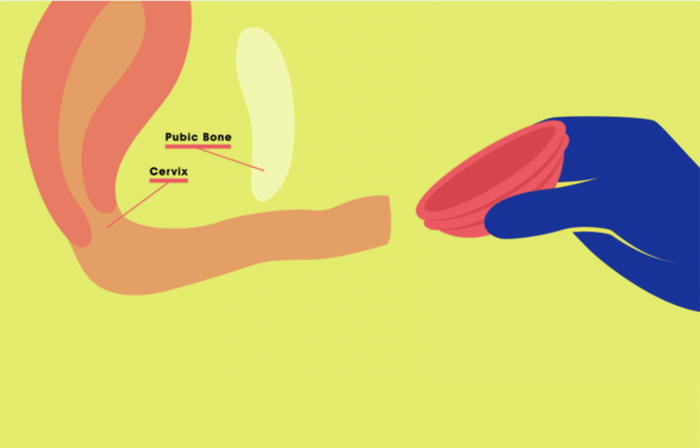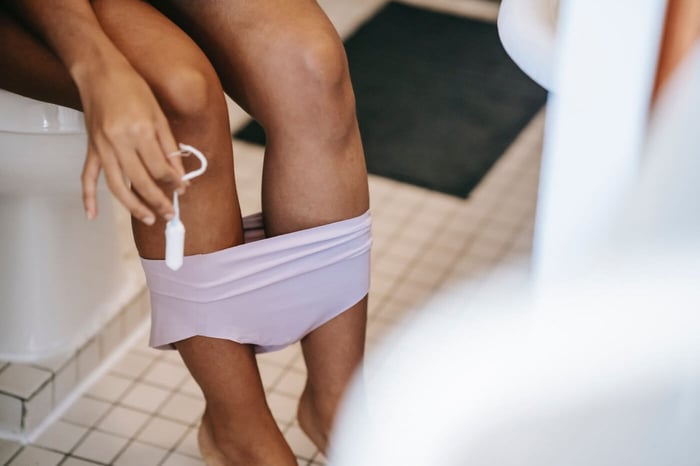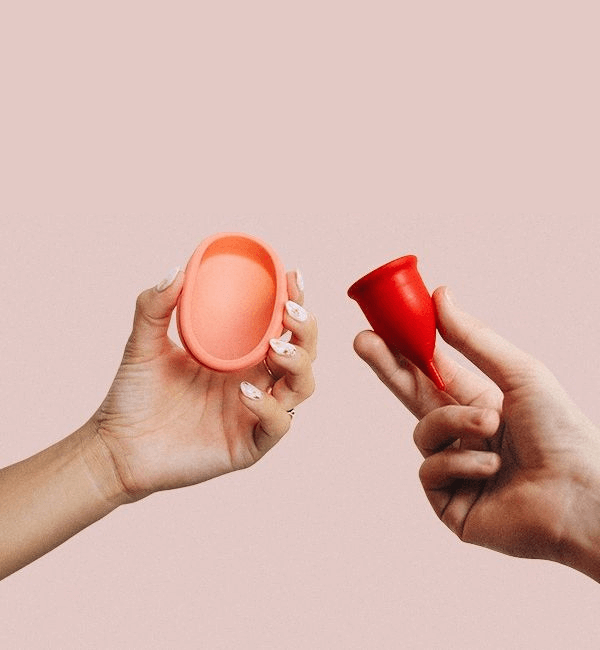Wondering how things will work once you make the switch to menstrual discs? Even if you're no stranger to using alternative period products, getting used to a different type of device takes time. Remember being anxious about using pads or tampons for the very first time? It’s normal!
It’s true menstrual discs have a circular, flatter shape and are inserted deeper into the vagina, but no, it won’t take you forever to get the hang of it, if that’s what you thought.
Care to find out how to insert a menstrual disc in under 3 minutes? You’ve landed on the right page.
Today, nixit steps in to give wings to new disc users. Below are some time-saving ideas that will help you master the insertion technique.
Get in touch with your anatomy
To place your menstrual disc correctly, first you need to get in touch with your anatomy. Once you figure out which part is which (i.e. where the cervix is, and your vaginal fornix vs. vaginal canal), it’ll be easier to feel and visualize where exactly your disc should fit.
Vaginal Fornix
Menstrual discs sit in the vaginal fornix. It’s a wider cavity placed in the upper part of your vaginal canal right below the cervix.
This recess is large enough to accommodate the wider disc size. All you should do is slide the disc into your vagina by guiding it back and down towards your tailbone. This way, you’ll ensure the disc envelops the entire cervix.
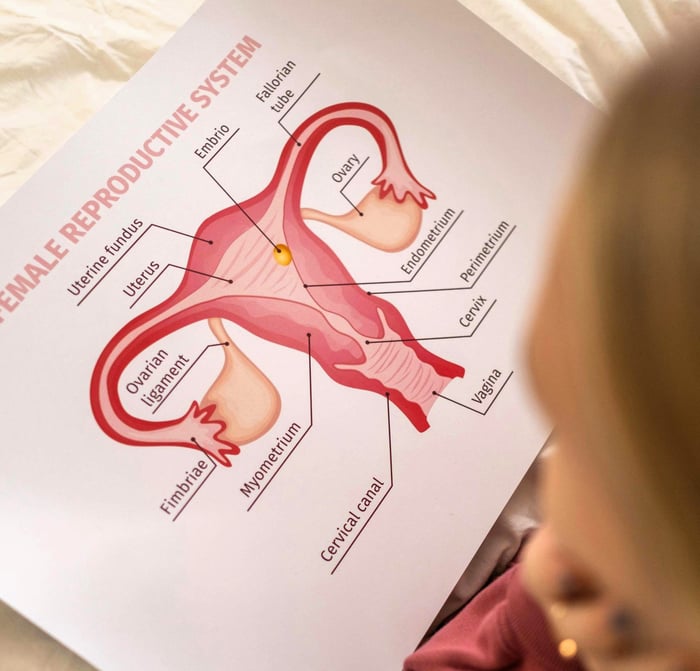
Pubic Bone
Once you’ve inserted the front of your disc back in your fornix, you should secure the rim closest to the vaginal opening by tucking it up behind your pubic bone. To feel it before insertion, slide your finger into your vagina (palm side up) and curl it up. The hard part you feel is your pubic bone.
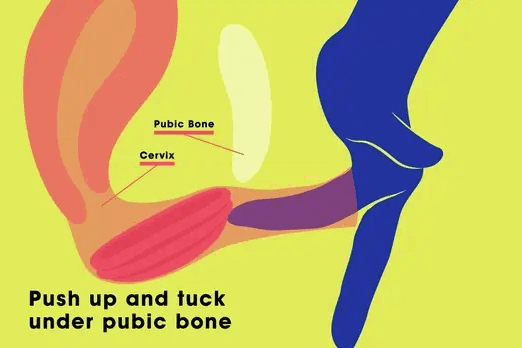
No Suction Required
Once inserted properly, a menstrual disc will conform to your anatomy and stay at the base of your cervix thanks to your pubic bone. Meaning, there’s no suction or seal to break during removal (unlike with menstrual cups).
How to Insert a Menstrual Disc?
Step #1: Wash your hands with soap and water.
Step #2: Pinch your menstrual disc in half, then use your forefinger to direct one end of the disc back and down towards your tailbone. Switching to your thumb can help you get the right angle while sliding the disc down. Either way, make sure you push the disc all the way through so it fully covers your cervix.
Step #3: Next, push the front rim of the disc up to tuck it behind your pubic bone. Don’t hesitate to push it up as far as it would go.
Step #4: Once in place, the disc will collect your menstrual flow for the next 12 hours, hurray!
NOTE: Different insertion positions and methods work better for some than others. It’s a matter of trial and error until you figure out what works best for you. Instead of sitting on the toilet, try a deep squat or standing with one foot on the toilet. While inserting, try different fingers or methods such as this one below.
@letsnixit This nixit insertion tip is a user favourite for a reason! #nixit #menstrualdiscs #periods ♬ as it was bridge - niall horans bff Many of those who use a menstrual disc (and have tried cups as well) report that the insertion is much easier than with menstrual cups. There are no awkward folding techniques to master and no bother trying to get the perfect suction.
If you’ve had issues with disposable menstrual products, a menstrual disc like nixit might be the ticket for you. Once inserted properly, you won't be able to feel it. It’s a set-and-forget device you can use on the go.
Addressing Issues You May Have With Disc Insertion
What If I have a High Cervix?
If your cervix is high and you don’t push the disc all the way through to reach it, you may experience leaks.
To stop this from happening, you may need to reach deeper into your vagina to push the cup into position.
Note that your cervix will change positions during your monthly cycle, so it’s best to follow what feels right for your body as you go through those changes.
What If I Have a Low Cervix?
Having a low cervix is not an obstacle to wearing a menstrual disc. This may become a concern if you're wearing traditional cups. If a cup has a long stem, it can get in the way and cause irritation or discomfort.
Menstrual discs are stem-free and as such are ideal for people with a low cervix. They also have a flat container which makes them easier to fit, regardless of your cervix height or your size for that matter.
What If My Menstrual Disc Leaks?
If your menstrual disc leaks, whatever you do, don't throw it away immediately. A more constructive way to go about things is to polish up the insertion technique a bit. For your disc to be able to catch blood reliably, it needs to cover the entire cervix.
If it stays in front of your cervix, it simply won’t work, as the base of the disc will not be under the cervix to catch your flow.
To make your disc experience leak-proof, first take a deep breath (it’ll help your pelvic floor muscles relax), then get to work.
Remember to push your disc down and back towards your tailbone. NEVER push it straight up, like you do a tampon.
Finally, once the disc is in place, make sure you give it one final push. Sometimes it takes a harder push on the front edge of the disc if you want it to tuck behind the pubic bone securely.
@letsnixit 3 mistakes you might be making with your nixit menstrual disc #menstrualdiscs #nixit ♬ Sunroof - Nicky Youre & dazy Why nixit?
nixit is not only easy to insert, it’s a comfortable, soft menstrual disc that offers 12 hours of protection and an added option of having mess-free period sex.
Most importantly, it’s one of the most environmentally-friendly options available today. The disc lasts you for around 5 years, working to your best advantage while giving mother nature a breather it deserves. Single-use products, which absorb blood for a mere few hours, take hundreds of years to decompose.

Source: Twitter
If you want a reusable menstrual cup that will cover both you and the environment, the nixit menstrual disc can give you that.

nixit is a disc-shaped menstrual cup made from 100% medical-grade silicone. It collects your flow like a cup, but it comes in a circular shape and sits in the vaginal fornix, like a disc - giving you the best of both worlds.
This means you can rake in all of the benefits listed below and more:
nixit holds 70 ml of menstrual fluid, which is far more than any menstrual cup or tampon. This makes it ideal for people with a heavy flow.
You can wear it during sexual intercourse. The disc’s body is smooth and soft, allowing for comfortable mess-free penetrative sex (unlike menstrual cups, for example).
Thanks to its double rim which makes the disc extra secure, nixit can offer you a 100% leak-proof experience.
nixit keeps the risk of developing toxic shock syndrome at a record low. Unlike tampons, a disc’s surface is non-porous, which isn’t exactly the best environment for bacteria to thrive. The most frequent cause of TSS is leaving a super-absorbent tampon in for too long.
nixit is a safer option than cups to use with IUDs. If you’re not being careful when breaking the seal with a menstrual cup, you can dislodge your IUD. nixit is suction-free which changes things in this department. To be on the safe side we advise a physician consultation if you’re an IUD user.
Bottom Line
So, there you go. Some tips and tricks to help you use a menstrual disc. What you get for the 3-minute hassle (you’ll be able to shorten this interval with time) is 12 hours of freedom to go about your day plus a leak-free experience.
You may be considering menstrual discs because they’re suction-free. You may have had issues with suction pain or you may have experienced leaks, never getting the suction part quite right.
Or you’re looking for a more comfortable and eco-friendly solution to tampons and pads. Whichever the case, menstrual discs are a great alternative.
With some insider tips under your belt, you’ll be able to ease into using them like a pro. At nixit, our mission is to empower people to make informed decisions about their period products.
Check out our popular Menstrual Disc: Your A to Z Beginner Guide or contact us at hello@nixit.com for more information.

